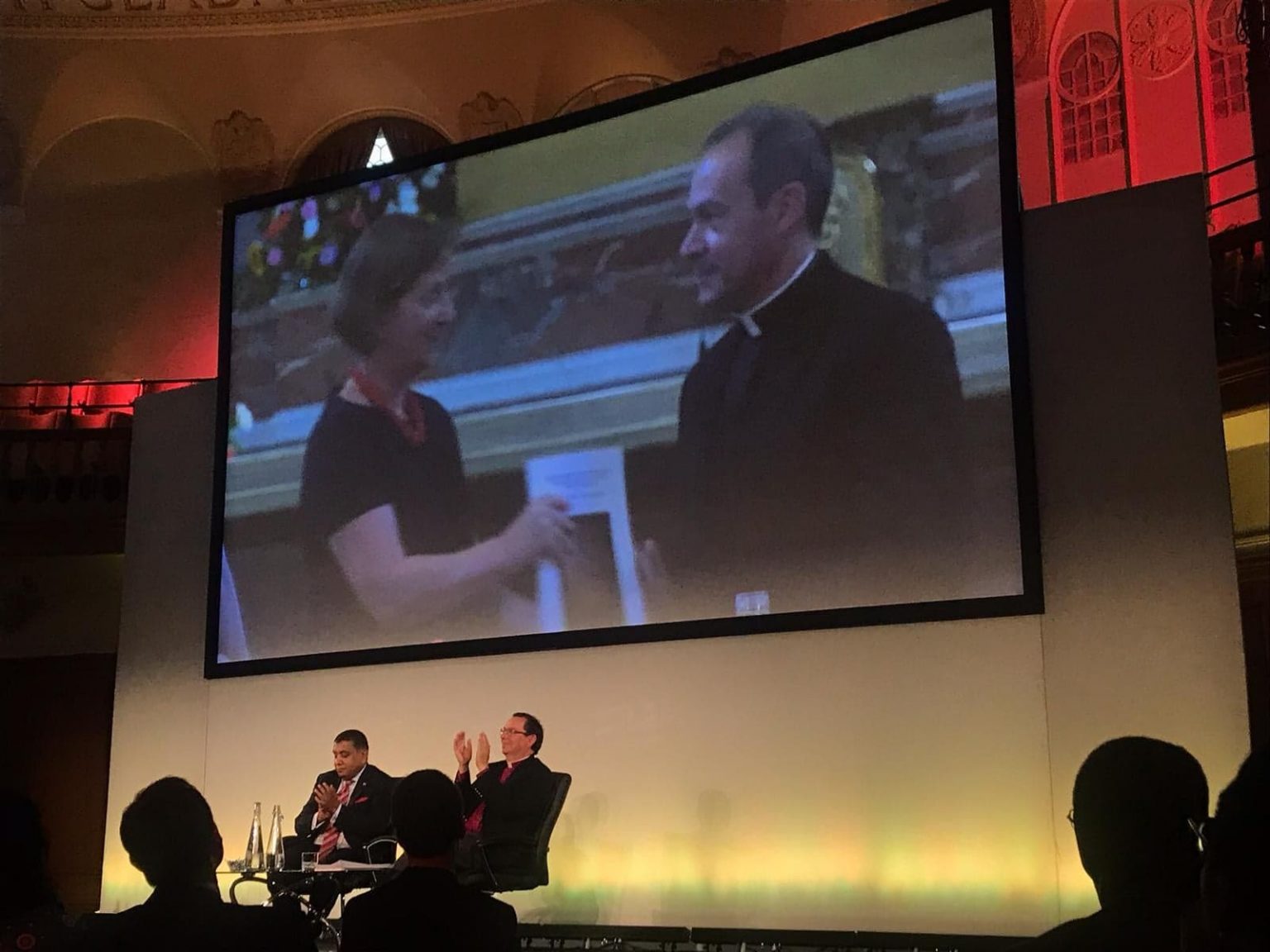BACA’s submissions to the Bishop of Truro’s ‘Independent Review of Foreign and Commonwealth Office (FCO) support for persecuted Christians’ are now available online
We are pleased to note that two of the three submissions presented by the British Asian Christian Association (when it was called the British Pakistani Christian Association – BPCA) to the Bishop of Truro’s ‘Independent Review of Foreign and Commonwealth Office (FCO) support for persecuted Christians’ have just been published online by the Independent Review Team. They can be read at: https://christianpersecutionreview.org.uk/storage/2019/09/Pakistan-BPCA-Submission.pdfandhttps://christianpersecutionreview.org.uk/storage/2019/09/Pakistan-BPCA.pdf.
The Review was commissioned by the FCO and sought to map the extent and nature of the global persecution of Christians; assess the quality of the response of the FCO and make recommendations for changes in both policy and practice. BPCA’s submissions were jointly authored by Desmond Fernandes (former Senior Lecturer at De Montfort University) and Wilson Chowdhry (former chair of the BPCA). BPCA had also submitted its recently published 490 page book, ‘Call it by its name – Persecution!’ (authored by Desmond Fernandes) to the FCO and Independent Review Team in the hope that the concerns it raised would be reflected upon.
In our submissions, we raised the following points:
1) Pakistan was at the time listed at number 5 on the World Watch List, Open Doors’ ranking of the 50 countries where Christians experience the ‘most extreme’ levels of persecution. Other documentation supports the finding that Christians in Pakistan face extreme forms of persecution. As Lord Alton has cautioned “If a systematic campaign of bombings, killings, the burning alive of people and their homes, the rape and forced marriage of Christian girls, and a systematic campaign whipping up hatred doesn’t amount to persecution, it is hard to imagine what would have to happen before it is described as persecution”.[i]
We detailed how the FCO has been inconsistent in explicitly acknowledging the persecution that Christians face in Pakistan. At times, it has clearly stated this reality, yet at other times has seemingly chosen to deliberately refrain from using the ‘p’ (persecution) word (seemingly to not offend certain domestic/international audiences and lobbies within government).
We suggested that the FCO, if it is sincere in its wish to champion the cause of persecuted Christians worldwide (and in Pakistan), might simply consider consistently using the term when and where Christians are subjected to persecution and the documented evidence sustains such a categorisation.
We suggested that the FCO might consider acknowledging and pointing out these realities not just internationally but during its meetings with Home Office representatives (of the kind we have noted in our documentation) where refugee and asylum ‘persecution/non-persecution’ guidance/status is discussed with particular reference to countries where Christians and targeted ‘Others’ are being persecuted.
Currently, the Home Office ignores the documented evidence and continues with its dangerously flawed ‘guidance’ which seeks to deny that Christians, “in general”, even face persecution in Pakistan. As long as the FCO fails to meaningfully engage with the Home Office to point out the latter’s scandalous stance and as long as it chooses to advance the government’s ‘hostile/compliant environment’ policy and other ‘deep political’ agendas (of the kind we and others have detailed and documented), we pointed out that Pakistani Christian asylum seekers will continue to scandalously be deported from the UK to a country where their lives will remain at ‘high risk’.
We are pleased to note, with respect to its case study assessment of Pakistan, that these considerations were taken on board. The Independent Review’s final report recommended that UK “FoRB [right to freedom of thought, conscience, religion or belief] policy should be reconsidered. This policy is no doubt closely tied to HM Government policy” – i.e. the ‘hostile/compliant environment’ policy – “in relation to the application of asylum law to those whose vulnerability is defined by their religious faith. Whilst this policy remains unchanged in Westminster and Whitehall, the High Commission’s ability to provide support to Pakistan’s vulnerable religious minorities will remain fettered”.[ii]
We additionally noted that many persecuted Pakistani Christians seeking asylum in Thailand and Malaysia were and are being refused refugee status because the flawed country ‘guidance’ of the Home Office was and is being used by the UN refugee agency (UNHCR) to delegitimize many of their claims, resulting in their deportation, further risking their lives.
2) The FCO officially “aims to safeguard Britain’s national security by countering terrorism and weapons proliferation and working to reduce conflict … The UK is part of the global coalition working together to counter the threat of ISIL. The FCO is supporting the UK’s military response and provision of humanitarian aid in the region … [and] with guidance from the National Security Council, a new £1 billion Conflict, Stability and Security Fund (jointly managed by the FCO, Ministry of Defence and the Department for International Development) … aims to address the short-term impacts of conflict while building political, economic and security institutions to bring longer-term stability”.[iii]
With this in mind and given the terms of reference guiding the Bishop of Truro’s ‘Independent Review of Foreign and Commonwealth Office (FCO) support for persecuted Christians’ (it was tasked to provide recommendations), we asked the review team to reflect upon whether the FCO can consider internally examining, acknowledging and successfully halting/confronting/altering certain covert British governmental policies (documentation and sources provided) that support extremist terrorist groups and other governments in certain ‘initiatives’ that result in increased persecution of Christians and targeted ‘Others’ worldwide. We believe that any such initiatives can make a practical and meaningful contribution towards reducing levels of persecution of Christians and targeted ‘Others’ worldwide.
We alerted the Independent Review Team to the published findings of Griffing in December 2018 – and how relevant they have proven to be, in light of the ongoing military offensive by Turkish military forces allied to jihadist extremist forces[iv] into northern Syria – that even then, “up to 15,000 Syrian rebels, including from the Free Syrian Army” – which the British government has promoted – “are ready to join a Turkish military offensive … in northeast Syria”,[v] which is likely to result in terrible persecution of Christian and Kurdish and ‘Othered’ populations.
We drew attention to Nafeez Ahmed’s findings that all too often, “missing from the chorus of outrage” over ISIS “has been any acknowledgement of the integral role of covert US and British regional military intelligence strategy in empowering and even directly sponsoring the very same virulent Islamist militants in Iraq, Syria and beyond, that went on to break away from al-Qaeda and form ISIS, the Islamic State of Iraq and Syria, or now simply, the Islamic State (IS) … Since 2003, Anglo-American power has secretly and openly co-ordinated direct and indirect support for Islamist terrorist groups linked to al-Qaeda across the Middle East and North Africa”.[vi]
Charles Shoebridge, a former British Army and Metropolitan Police counter terrorism intelligence officer, has “pointed out that the US and UK in particular, ‘through the covert work of MI6 and the CIA’, appear to have ‘played a key role in facilitating the flow of arms and jihadist fighters to Syria from such places as Libya, the Caucuses and Balkans, with the aim of militarily boosting those fighting Assad … It should also be noted in this respect that the moderate rebels the US and UK support, themselves openly welcomed the arrival of such extremists. Indeed, the Free Syria Army (FSA) backed by the West was allied with ISIS, until ISIS attacked them at the end of 2013. Still, [even by 2014], ‘moderate’ rebels backed by the US and UK [we]re allied with Syrian al Qaeda affiliate al Nusra, despite the US and UK having banned this group at home'”.[vii]
If the Bishop of Truro and the authors of the Independent Review on persecution also wished to confront and address the issue of persecution of Christians and ‘Others’ internationally and what could practically be done by the FCO and other UK bodies to address it, we suggested they consulted and read the detailed material and recommendations of Craig Murray, British Ambassador in Uzbekistan from 2002 to 2004. In 2009, he noted that he could “testify that beyond any doubt the British government has for at least six years a considered but secret policy of cooperation with torture abroad”.[viii]
If this covert policy is still in place, it clearly can and will have consequences for Christians and ‘Othered’ persecuted people. Forcing and/or calling a stop to this and/or exposing this can have practical effect in helping to assist persecuted people, including persecuted Christians. We also referred the Independent Review Team to the detailed analyses and findings (drawing upon declassified records) of historian Mark Curtis (a former Research Fellow at Chatham House and the ex-Director of the World Development Movement): “The mainstream media and propaganda system has been tremendously successful in the UK – the public can surely have very little knowledge of the actual nature of British foreign policy (past or present) … Governments retain enormous power to conduct covert operations (and policies generally) outside of public or parliamentary scrutiny”[ix] which often, of course, facilitate persecution.
“Parliamentary committees, meant to scrutinise the state, rarely do so properly and almost invariably fail to even question government on its most controversial policies. Parliamentary answers are often misleading and designed to keep the public in the dark. Past historical records of government decision-making are regularly withheld from the public, if not destroyed to cover up crimes … There are fundamental issues here about how policy gets made and in whose name …
“I’ve tried to document in the updated version of [my book] Secret Affairs a chronology of Britain’s covert operations in Syria to overthrow the Assad regime. These began with the deployment of MI6 and other British covert forces in 2011 … British covert action, mainly undertaken in alliance with the US and Saudi Arabia, has involved working alongside radical and jihadist groups, in effect supporting and empowering them” – even as it has been clear by their ideological orientation that they have clearly persecuted Christians and targeted ‘Others’.
“These extremist groups, which cultivated Muslim volunteers from numerous countries to fight Assad, have been strengthened by an influx of a massive quantity of arms and military training from the coalition of forces of which Britain has been a key part. At the same time, Britain and its allies’ policy has prolonged the war, exacerbating devastating human suffering” and persecution.
“UK support for Syrian rebel groups”, Curtis concludes, “long focused on the Free Syrian Army (FSA), described by British officials as ‘moderates’. Yet for the first three years of the war, the FSA was in effect an ally of, and collaborator with, Islamic State and al-Qaida’s affiliate in Syria, al-Nusra. London and Washington continued to provide training and help send arms into Syria despite the certainty that some would end up in the hands of jihadists … More recently, in its military interventions and covert operations in Syria and Libya since 2011, Britain and its supported forces have been working alongside, and often in effective collaboration with, a variety of extremist and jihadist groups, including al-Qaida’s affiliate in Syria”.[x]
Sign our petition to stop UK foreign aid to Pakistan (here)
BPCA regularly writes submissions for UK Government inquiries and for international reviews such as the Universal Periodic Review of Pakistan and other nations by the United Nations. Please help us continue this valuable advocacy work by donating (here).
[i] Alton (2019) ‘Introduction’, in Fernandes, D. (2019) Call it by its name: ‘Persecution!’ BPCA’s Response and Update to the Home Office’s Country Policy and Information Note – Pakistan: Christians and Christian converts [Version 3.0, September 2018] and its linked May 2016 report (BPCA: London, February 2019), p. 7, 8.
[ii] See: https://christianpersecutionreview.org.uk/report/.
[iii] NAO (2015) ‘A Short Guide to the Foreign & Commonwealth Office’, NAO, June 2015 (accessed at: https://www.nao.org.uk/wp-content/uploads/2015/08/Foreign-Commonwealth-Office-short-guide1.pdf).
[iv] See Hond, C. (2019) ‘The Turkish invasion of Syria: A new hope for Jihadists’, Open Democracy, 16 October 2019 (accessed at: https://www.opendemocracy.net/en/north-africa-west-asia/turkish-invasion-syria-new-hope-jihadists/); Harp, S. (2019) ‘Tired of Winning: Trump Surrenders Northern Syria to Turkish Jihadists’, Rolling Stone, 14 October 2019 (accessed at: https://www.rollingstone.com/politics/politics-features/trump-syria-kurds-turkey-isis-898524/); Philips, D. (undated) ‘ISIS-Turkey Links’ (accessed at: https://docs.house.gov/meetings/FA/FA14/20170405/105842/HHRG-115-FA14-Wstate-PhillipsD-20170405-SD001.pdf); Sweeney, S. (2019) ‘Turkish forces and jihadists surround Kurdish towns as invasion continues’, Morning Star, 10 October 2019 (accessed at: https://morningstaronline.co.uk/article/turkish-forces-and-jihadists-surround-kurdish-towns-invasion-continues) and Sweeney, S. (2019) ‘NATO’s second largest army prepares to roll into Rojava’, Morning Star, 10 October 2019 (accessed at: https://morningstaronline.co.uk/article/w/nato-second-largest-army-prepares-to-roll-into-rojava).
[v] Griffing, A. (2018) ‘Explained – Trump Abandons Syria’s Kurds: Will Turkey Now Crush Their Dream of a ‘Secular Utopia?’, Haaretz, 22 December 2018 (accessed at: https://www.haaretz.com/middle-east-news/syria/trump-abandons-the-kurdsin-syria-will-turkey-now-crush-their-secular-utopia-1.6765593).
[vi] Ahmed, N. (2014) ‘Follow the Money; Follow the Oil: How the West Created the Islamic State. Part 1 – Our terrorists’, Counterpunch, 12-14 September 2014 (accessed at: http://www.counterpunch.org/2014/09/12/how-the-west-created-the-islamic-state/).
[vii] Ahmed, N. (2014) ‘Follow the Money; Follow the Oil: How the West Created the Islamic State. Part 1 – Our terrorists’, Counterpunch, 12-14 September 2014 (accessed at: http://www.counterpunch.org/2014/09/12/how-the-west-created-the-islamic-state/).
[viii] See Murray, C. 2009. ‘Your Help Needed – Reveal Torture to Stop It’, 4 March 2009 (accessed at: https://www.craigmurray.org.uk/archives/2009/03/your_help_neede/).
[ix] Sinclair, I. 2018. ‘Britain’s collusion with radical Islam: Interview with Mark Curtis’, Open Democracy, 18 March 2018 (accessed at: https://www.opendemocracy.net/uk/ian-sinclair/britain-s-collusion-with-radical-islam-interview-with-mark-curtis).
[x] Sinclair, I. 2018. ‘Britain’s collusion with radical Islam: Interview with Mark Curtis’, Open Democracy, 18 March 2018 (accessed at: https://www.opendemocracy.net/uk/ian-sinclair/britain-s-collusion-with-radical-islam-interview-with-mark-curtis).


